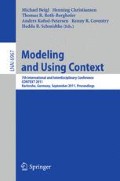Abstract
This paper outlines our current research program in the fields of ambient intelligence and context-aware computing and the tools we are building to accomplish this research program. From a discussion of our conception of mental models in the domain of ambient context-aware computer systems we derive hypotheses which we intend to test empirically. A modular framework for implementing and assessing situation awareness in humans and computers is introduced. We describe the framework’s architecture and illustrate its suitability for its intended purpose. Finally, we present an outline of our next steps towards real world application systems for our research.
Access this chapter
Tax calculation will be finalised at checkout
Purchases are for personal use only
Preview
Unable to display preview. Download preview PDF.
References
Weiser, M.: The Computer for the Twenty-First Century. Scientific American 265, 94–100 (1991)
Johnson-Laird, P.N.: Mental Models: Towards a Cognitive Science of Language, Inference, and Consciousness. Harvard University Press, Cambridge (1983)
Craik, K.J.W.: Theory of the human operator in control systems. I. The operator as an engineerig system. British Journal of Psychology 38, 56–61 (1947)
Endsley, M.R., Bolté, B., Jones, D.G.: Designing for Situation Awareness. Taylor & Francis, London (2003)
Baddeley, A.D.: The episodic buffer. A new component of working memory? Trends in Cognitive Sciences 4(11), 418–423 (2000)
Van Dijk, T.A., Kintsch, W.: Strategies of discourse comprehension. Academic Press, New York (1983)
Gentner, D., Stevens, A.L.: Mental Models. Lawrence Erlbaum Associates, Hillsdale (1983)
Wilson, J.R., Rutherford, A.: Mental models: theory and application in human factors. Human Factors 31(6), 617–634 (1989)
Norman, D.A.: Some Observations on Mental Models. In: Gentner, D., Stevens, A.L. (eds.) Mental Models, pp. 7–14. Lawrence Erlbaum Associates, Hillsdale (1983)
Kindsmüller, M.C.: Trend-Literacy. In: Zur Interpretation von Kurvendarstellungen in der Prozessführung. Shaker Verlag, Aachen (2006)
Rouse, W.B., Morris, N.: On looking into the black box: Prospects and limits in the search for mental models. Psychological Bulletin 100(3), 349–363 (1986)
Turner, R.: Context-mediated behavior for intelligent agents. International Journal of Human-Computer Studies 48(3), 307–330 (1998)
Halliday, M.A.K., Hasan, R.: Language, Context, and Text: Aspects of Language in a Social-semiotic perspective. Deakin University, Victoria (1985)
Schmitt, F., Cassens, J., Kindsmüller, M.C., Herczeg, M.: Mental Models of Disappearing Systems: Challenges for a Better Understanding. In: Cassens, J., Kofod-Petersen, A., Zacarias, M., Wegener, R. (eds.) Proceedings of the Sixth International Workshop on Modelling and Reasoning in Context, Lisbon, CEUR-WS.org (2010)
Fogarty, J., Hudson, S.E., Lai, J.: Examining the robustness of sensor-based statistical models of human interruptibility. In: Dykstra-Erickson, E., Tscheligi, M. (eds.) CHI 2004: Proceedings of the SIGCHI Conference on Human Factors in Computing Systems, pp. 207–214. ACM, New York (2004)
Hudson, S.E., Fogarty, J., Atkeson, C.G., Avrahami, D., Forlizzi, J., Kiesler, S., Lee, J.C., Yang, J.: Predicting Human Interruptibility with Sensors: A Wizard of Oz Feasibility Study. In: Cockton, G., Korhonen, P. (eds.) CHI 2003: Proceedings of the SIGCHI Conference on Human Factors in Computing Systems, pp. 257–264. ACM, New York (2003)
Ruge, L.: Koordinierung von Inferenz- und Lernprozessen für Pervasive-Computing-Anwendungen. Diploma thesis, University of Lübeck (2010)
Sirin, E., Parsia, B.: Pellet: An OWL DL reasoner. In: Haarslev, V., Möller, R. (eds.) 2004 International Workshop on Description Logics, pp. 212–213 (2004)
Aamodt, A., Plaza, E.: Case-Based Reasoning: Foundational Issues, Methodological Variations, and System Approaches. AI Communications 7(1), 39–59 (1994)
Chen, H.: An Intelligent Broker Architecture for Pervasive Context-Aware Systems. PhD thesis, University of Maryland, Baltimore County (2004)
Chen, H., Finin, T., Joshi, A.: The soupa ontology for pervasive computing. In: Calisti, M., Walliser, M., Brantschen, S., Herbstritt, M., Tamma, V., Cranefield, S., Finin, T., Willmott, S. (eds.) Ontologies for Agents: Theory and Experiences. Whitestein Series in Software Agent Technologies and Autonomic Computing, pp. 233–258. Birkhäuser, Basel (2005)
Ejigu, D., Scuturici, M., Brunie, L.: CoCA: A Collaborative Context-Aware Service Platform for Pervasive Computing. In: Latifi, S. (ed.) ITNG 2007: Proceedings of the International Conference on Information Technology, pp. 297–302. IEEE Computer Society, Washington, DC (2007)
Stevenson, G., Knox, S., Dobson, S., Nixon, P.: Ontonym: a collection of upper ontologies for developing pervasive systems. In: Gomez-Perez, J. (ed.) CIAO 2009: Proceedings of the 1st Workshop on Context, Information and Ontologies, pp. 1–8. ACM, New York (2009)
Plaza, E., Ontañón, S.: Ensemble Case-Based Reasoning: Collaboration Policies for Multiagent Cooperative CBR. In: Aha, D.W., Watson, I. (eds.) ICCBR 2001. LNCS (LNAI), vol. 2080, pp. 437–451. Springer, Heidelberg (2001)
Jagannathan, V., Dodhiawala, R., Baum, L.S. (eds.): Blackboard Architectures and Applications. Academic Press, Orlando (1989)
Scheele, B., Groeben, N.: Die Heidelberger Struktur-Lege-Technik (SLT). Eine Dialog-Konsens-Methode zur Erhebung subjektiver Theorien mittlerer Reichweite. Beltz, Weinheim (1984)
Novak, J.D., Cañas, A.J.: The theory underlying concept maps and how to construct and use them. Tech. rep., Florida Institute for Human and Machine Cognition, IHMC (2008)
Norman, D.A., Draper, S.W.: User Centered System Design: New Perspectives on Human-Computer Interaction. Lawrence Erlbaum, Hillsdale (1986)
Palmer, S.R., Felsing, J.M.: A Practical Guide to Feature-Driven Development. Prentice Hall, Upper Saddle River (2002)
Author information
Authors and Affiliations
Editor information
Editors and Affiliations
Rights and permissions
Copyright information
© 2011 Springer-Verlag Berlin Heidelberg
About this paper
Cite this paper
Schmitt, F., Cassens, J., Kindsmüller, M.C., Herczeg, M. (2011). Mental Models of Ambient Systems: A Modular Research Framework. In: Beigl, M., Christiansen, H., Roth-Berghofer, T.R., Kofod-Petersen, A., Coventry, K.R., Schmidtke, H.R. (eds) Modeling and Using Context. CONTEXT 2011. Lecture Notes in Computer Science(), vol 6967. Springer, Berlin, Heidelberg. https://doi.org/10.1007/978-3-642-24279-3_29
Download citation
DOI: https://doi.org/10.1007/978-3-642-24279-3_29
Publisher Name: Springer, Berlin, Heidelberg
Print ISBN: 978-3-642-24278-6
Online ISBN: 978-3-642-24279-3
eBook Packages: Computer ScienceComputer Science (R0)

